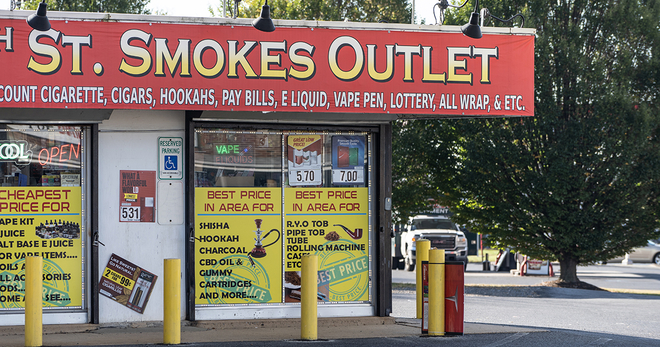Seeing through Big Tobacco’s Spin
Young Americans aren’t buying industry rebranding tactics and favor more regulation
Tobacco industry efforts to overhaul its reputation as it recruits a new generation of tobacco users are failing, according to new Truth Initiative® research. Faced with dramatic declines in smoking, the tobacco industry has been rolling out and aggressively marketing flashy new electronic and flavored products to grow its market among youth and young adults while trying to rebrand its image with large-scale public relations investments disguised as public health initiatives. These tactics, first exposed in the 2019 Truth Initiative report “Spinning a New Tobacco Industry,” are attempts to position Big Tobacco as part of the public health solution to end smoking, despite continuing to sell cigarettes, the known risks of nicotine addiction to youth, and lacking sufficient scientific evidence of the short- or long-term health effects of new products like e-cigarettes and heated tobacco devices.
As the tobacco industry undertakes this ongoing charm offensive, Truth Initiative continues to monitor these activities and measure public opinion. New survey findings show that youth and young adults (15-28) overwhelmingly believe that tobacco and vaping companies lie about the harm of their products, spread faulty research, attract kids with flavored products and should be regulated more. This distrust was reported even among a large majority of tobacco users. Youth and young adults were also even more distrusting of the tobacco industry than the adults we surveyed in April 2019 and were more certain of their opinions.
While young people overwhelmingly see through Big Tobacco and its attempts to lure them in, they are using tobacco products at rates unseen in years, revealing how powerful, persuasive and addictive the industry and its products are. One in five high school students (19.6%) and one in 20 middle school students (4.7%) reported being a current e-cigarette user and new Truth Initiative research shows that young people who vape are more likely to go on to smoke cigarettes. Understanding youth perceptions of tobacco companies is critical to counteract industry efforts to protect its bottom line for generations to come.
While young people overwhelmingly see through Big Tobacco and its attempts to lure them in, they are using tobacco products at rates unseen in years.
YOUNG PEOPLE OVERWHELMINGLY DISTRUST THE TOBACCO INDUSTRY
In order to gauge young people’s opinions about the tobacco industry, Truth Initiative researchers surveyed nearly 10,000 young people aged 15-28 from September to December 2019.
In addition to believing that vaping companies lie about how harmful their products are (92%) and believing them to be dishonest about the health effects of their products (69%), young people didn’t buy that tobacco companies are part of the solution to end smoking (65%).
Young people are also savvy about tobacco industry tactics to addict them. They overwhelmingly believed that the tobacco industry uses fruit and candy flavors to get young people to try e-cigarettes (79%). In fact, research tells us that 97% percent of youth who vape use flavors and more than 80% of youth 12-17 who have used tobacco report that they began with a flavored product.
Respondents also sensed that tobacco companies want young people to try e-cigarettes so that they will start smoking (85%). Recent studies have shown how likely this route to smoking can be. Young people 15-27 who had ever used e-cigarettes had seven times higher odds of ever using cigarettes one year later compared with those who had never used e-cigarettes, according to a new Truth Initiative study.
Young people also recognized the need for greater regulation, with most believing government regulations on e-cigarette and vaping companies were too weak (52%) and only 5% believing they were too tough. Indeed, weak restrictions on flavored e-cigarettes have continued to drive youth vaping epidemic. While new 2020 federal data show youth vaping has declined, it remains at epidemic levels in the absence of comprehensive e-cigarette regulation. Two product types exempted from recent federal restrictions — disposable and menthol-flavored e-cigarettes — rapidly gained nearly three-quarters of the e-cigarette market and disposable use among high school students increased 1,000% over last year. The Food and Drug Administration decision to leave e-cigarettes on the market without any review of their benefit to public health — despite its statutory obligation to conduct a review before allowing products on the market – enabled the onset of the youth e-cigarette epidemic and the ongoing lack of comprehensive regulation allows it to continue.

65% of young people surveyed didn’t buy that tobacco companies are part of the solution to end smoking.
RACIAL GROUPS TARGETED BY THE TOBACCO INDUSTRY ARE LESS TRUSTING
Strong majorities of youth across all race and ethnicity groups questioned the motives and honesty of the tobacco and vaping industries. However, there were notable trends within specific racial and ethnicity groups.
African American and Hispanic or Latino youth distrusted the industry more intensely than white youth. When asked if tobacco companies lie about the harmfulness of their products and if they believed tobacco companies want young people to try vaping so they start smoking, more African American and Hispanic or Latino youth agreed strongly or very strongly. Both groups have long been targeted by the tobacco industry. Tobacco companies have strategically targeted African-Americans in particular with menthol tobacco products, including placing more advertising in predominantly black neighborhoods and in outlets popular with black audiences, as well as appropriating culture in marketing, including sponsoring events such as jazz and hip-hop festivals.
When asked if tobacco companies are honest about the health effects of their products, white and Hispanic or Latino youth disagreed more intensely than African American youth. However, strong majorities in all groups disagreed with the statement that tobacco companies are honest.
African Americans had the highest rate of “don’t know” responses—although there were a high number of “don’t know” responses across all racial groups. For example, African American youth and young adults were less sure than other racial groups if tobacco companies use fruit and candy flavors to get young people to try e-cigarettes and if politicians who take money from the industry are less likely to pass laws to protect youth — although all groups overwhelmingly recognized these statements as true. African American youth and young adults were also the only group where less than a majority thought government regulations on e-cigarette and vaping companies were too weak (42%).
For all youth and young adults — and African Americans in particular — these patterns indicate vulnerability to tobacco industry messaging and a critical opportunity for education and outreach.
|
Tobacco companies are honest about the health effects of their products |
|||
|
Race/ethnicity |
True |
False |
Don’t Know |
|
Non-Hispanic White/ European American |
16% |
71% |
13% |
|
Non-Hispanic Black/African American |
21% |
61% |
18% |
|
Hispanic or Latino |
17% |
68% |
16% |
|
Non-Hispanic Other |
18% |
71% |
11% |
Exposing racial targeting
The truth® campaign exposes industry tactics so that young people can make informed choices and influence others to do the same. truth has exposed Big Tobacco’s racial targeting with campaigns and videos such as “Making Menthol Black,” “Read Between the Lies,” “Worth More” and “Stop Profiling,” among others. Learn more about the campaign at thetruth.com.
EVEN TOBACCO USERS DON’T BELIEVE BIG TOBACCO
Even those who smoke or vape reported distrust of the tobacco industry in large numbers. Just under 30% of current smokers and 18% of former smokers thought that tobacco companies are honest about the health effects of their products. Only 16% of current e-cigarette users disagreed that vaping companies lie about the harmfulness of their products.
Many current users also supported more regulation. About a third of current tobacco users (33% of smokers and 36% of vapers) believed regulations on e-cigarette and vaping companies were too weak. Most are not buying Big Tobacco’s attempts to sell a do-gooder image either. Only about a quarter of tobacco users (25% of smokers and 22% of vapers) believed the industry could be a part of the solution to end smoking.
While non-users report greater skepticism of Big Tobacco and more support for regulation than those who smoke or vape, the high rates of distrust among the tobacco industry’s own customers is stark.
ALL AGES DISTRUST THE TOBACCO INDUSTRY
To gauge how perceptions of youth and younger adults differed from those from older adults, Truth Initiative compared youth results to those of a survey of 1,200 adults 18 or older conducted six months prior to the youth survey. Questions in the youth survey were similar to questions asked in the adult survey. In general, perceptions of young people aligned with those of older adults.
Majorities in both groups:
- distrusted the industry
- thought stricter regulations on e-cigarette companies were warranted
- believed tobacco companies lie and target youth
Opinions about JUUL worsened among young people and adults when they found out tobacco industry giant Altria owns a portion of JUUL.
The historic distrust of Big Tobacco — stemming from the decades it spent deceiving the American public about the health risks of cigarettes — carries over to e-cigarettes once the connection is clear.
YOUNGER ADULTS MORE SKEPTICAL THAN OLDER ADULTS
Across the board, youth and younger adults were generally less trusting of the tobacco industry than older adults. Many more young people than adults believed that tobacco companies use candy or fruit flavors to get young people to try e-cigarettes (79% vs 56%) and that tobacco companies spread faulty research that makes their products seem less dangerous (62% vs 48%).
Several truth campaigns aimed at youth and young adults have focused on exposing industry tactics, including “Tested on Humans,” which highlighted how little is known about the long-term health effects of e-cigarettes. Building upon “Tested on Humans,” truth also launched “Ready to Ditch JUUL,” a campaign that highlighted how young people are quitting and driving those looking to quit e-cigarettes to the quit vaping program This is Quitting.
Younger people were also surer of their opinions and knowledge of the industry with fewer “don’t know” or “unsure” answers than older adults on all questions except the question on industry regulation.
|
Youth and Young Adults |
Adults 18+ |
||
|
Tobacco companies use candy or fruit flavors to get young people to try e-cigarettes/vapes |
79% True |
Tobacco companies are using candy and fruit flavors to market e-cigarettes to children under 18 years old |
56% True |
|
Tobacco companies spread faulty research that makes their products seem less dangerous |
62% True |
Tobacco companies spend a lot of money to spread faulty scientific research that misrepresents the health threats of their products |
48% True |
|
Tobacco companies are honest about the health effects of their products |
69% False |
Tobacco companies are honest with the public about the health effects of their products |
61% False |
|
Tobacco companies are part of the solution to end smoking by creating products like e-cigarettes |
65% False |
By creating products like e-cigarettes, tobacco companies are working to be part of the solution to reduce the health effects of smoking |
59% False |
|
Politicians who take money from tobacco companies are less likely to vote for laws that protect young people from tobacco use |
74% True |
Politicians who accept campaign contributions from tobacco companies are less likely to vote for laws that make it harder for youth to access and use tobacco |
66% True |
THE WAY FORWARD: HIGHLIGHTING INDUSTRY TACTICS TO BUILD ON YOUTH SKEPTICISM TO DISCOURAGE USE
After decades of watching its customer base dwindle, the tobacco industry seized on a lax regulatory environment to introduce new products, launched a targeted marketing campaign to draw in youth, introduced flavors to get them to try new products, and delivered high doses of nicotine to keep them coming back for more.
Despite intense industry efforts to change their image, people across all ages believe the industry misleads them, lies about the health effects of tobacco products and markets to youth by promoting fruit and candy flavors.
Young people appear to trust the industry even less, are more certain of their opinions and are more aware of industry tactics than older adults.
Although young respondents were skeptical of the tobacco industry, young people are reaching for tobacco products in unprecedented numbers —revealing how powerful, persuasive and addictive the industry and its products are. To counteract Big Tobacco’s attempts to innovate, we must continue to highlight industry tactics, prevent use, and encourage cessation. We must also work to dismantle the path of tobacco product innovation and marketing and capitalize on youth and young adult skepticism to spread the truth about industry targeting.
Specific strategies include:
- Highlight industry tactics and hold industry accountable – Continue to develop and expand media campaigns that keep the public well-informed of industry tactics. Tobacco companies are rightly concerned about how they are viewed by youth and young adults because industry sentiment is tied to tobacco use. Studies have shown that greater anti-industry sentiment and denormalization of tobacco leads to lower rates of use, higher frequency of quit attempts and higher quitting rates. The trends extend to newer e-cigarette products as well – discrediting industry sources around e-cigarettes decreases product use. Campaigns discrediting the industry need to specifically reach smokers and minority populations.
- Restrict youth tobacco access and use – The FDA must follow through on its authority to fully regulate e-cigarettes and enforce regulations that prevent youth from using tobacco. State and local jurisdictions can also enact comprehensive indoor smoking/vaping bans, higher taxes on tobacco products, and other point of sale policies that restrict youth access.
- Restrict flavored tobacco products – 80% of youth believe that the tobacco industry uses flavors to get them to try their products. The FDA must close loopholes in federal flavor policies that allow menthol and other flavored products to remain on the market. State and local governments can also enact sales restrictions on flavored tobacco products.
- Curb youth marketing and exposure. Tobacco companies have become more versatile in their advertising, using “influencers” on social media rather than ads to access their younger target audience. The media, marketing and entertainment sectors play a crucial role in preventing tobacco industry efforts to re-normalize tobacco use. The entertainment industry also must limit tobacco imagery in movies, video, and other entertainment content. A Truth Initiative study — the first to establish a link between smoking imagery and e-cigarette use — found that exposure to tobacco imagery through episodic programming can triple a young person’s odds of starting to vape. Public awareness of this issue and regulations to curb industry tactics are critical to limiting youth exposure.
- Address systemic disparities that make minority groups more vulnerable – African American participants were less sure of their opinions, likely attributed to systemic disenfranchisement by years of targeted tobacco marketing campaigns. Campaigns to highlight industry tactics must reach this demographic.
- Act on laws that protect public health – Youth and young adults think that tobacco regulation — particularly around e-cigarettes — is too weak. Most people want greater regulation of the tobacco industry and distrust lawmakers who appear to be financially entangled with the industry.
- Expand research. We need to better understand and identify ways to counter the widespread appeal of e-cigarettes and other tobacco products on youth. The tobacco industry is endlessly innovative. Ongoing surveillance of tobacco industry strategies and tactics as well as youth sentiment is essential to prevent further escalations in youth use.
Although it is encouraging to learn that most youth and young adults see through the tactics that the tobacco industry uses to addict them, there is still much to be done to prevent youth and at-risk minorities from falling for marketing tactics designed to ensnare them.
Understanding how the industry uses public relations to manipulate perceptions
While the tobacco industry continues to sell the only product that kills half its users when used as directed, it is also attempting to present itself as a responsible business entity that is part of the “public health solution” to end smoking. Examples of this “charm offensive” include the Foundation for a Smoke-free World, which is funded by Philip Morris International as well as the launch of PMI’s “Unsmoke Your World” campaign, which positions itself as the champion of this charge as a way to promote its e-cigarettes and heated tobacco products like IQOS.
SURVEY METHODOLOGY
These findings come from Truth Initiative’s latest survey of 9,557 youth and young adults ages 15-28. The survey was fielded September to December of 2019 as a part of the ninth wave of the Truth Longitudinal Cohort survey — a national, probability-based sample that uses online surveys primarily to evaluate mass media campaigns. The cohort uses address-based sampling methodology described elsewhere. The dataset was weighted to be representative of the national population.
Attitudes of older adults came from a Truth Initiative survey conducted in April 2019 that included a nationally representative panel of 1,200 adults 18 or older.
|
Adult Survey Measures |
Youth and Young Adult Survey Measures |
|
Vaping companies mislead the public about its products Response options included “Doesn’t describe”, “Very well”, “Pretty well”, “Not too well”, “Not well at all”, and “Don’t know.” |
Vaping companies lie about the harmfulness of their products The response options for these questions included “Do not agree”, “Somewhat agree”, “Strongly agree”, and “Very strongly agree.” |
|
Tobacco companies are honest with the public about the health effects of their products Response options included, “False”, “True”, and “Don’t know.” |
Tobacco companies are honest about the health effects of their products Response options included, “False”, “True”, and “Don’t know.” |
|
Tobacco companies deliberately market cigarettes to underage kids Response options included, “False”, “True”, and “Don’t know.” |
Tobacco companies want young people to try e-cigarettes/ vapes so they will start smoking The response options for these questions included “Do not agree”, “Somewhat agree”, “Strongly |
|
Tobacco companies are using candy and fruit flavors to market e-cigarettes to children under 18 years old. Response options included, “False”, “True”, and “Don’t know.” |
|
|
By creating products like e-cigarettes, tobacco companies are working to be part of the solution to reduce the health effects of smoking Response options included, “False”, “True”, and “Don’t know.” |
Tobacco companies are part of the solution to end smoking by creating products like e-cigarettes Response options included, “False”, “True”, and “Don’t know.” |
|
Politicians who accept campaign contributions from tobacco companies are less likely to vote for laws that make it harder for youth to access and use tobacco. Response options included, “False”, “True”, and “Don’t know.” |
Politicians who take money from tobacco companies are less likely to vote for laws that protect young people from tobacco use Response options included, “False”, “True”, and “Don’t know.” |
|
Tobacco companies spend a lot of money to spread faulty scientific research that misrepresents the health threats of their products Response options included, “False”, “True”, and “Don’t know.” |
Tobacco companies spread faulty research that makes their products seem less dangerous Response options included, “False”, “True”, and “Don’t know.” |
|
The tobacco industry tells the truth about the addictive nature of their products Response options included, “False”, “True”, and “Don’t know.” |
Tobacco companies are honest about the health effects of their products Response options included, “False”, “True”, and “Don’t know.” |
|
Tobacco companies do good things for your community, such as donate to local charities and organizations. Response options included, “False”, “True”, and “Don’t know.” |
Tobacco companies do good things for the community, like donate to charities Response options included, “False”, “True”, and “Don’t know.” |
|
From what you know, do you feel that using electronic cigarettes is a serious health hazard, a moderate health hazard, or not a health hazard at all? The response options included “a serious health hazard”, “a moderate health hazard”, or not a health hazard at all. |
No one knows the long-term effects of JUULing The response options for these questions included “Do not agree”, “Somewhat agree”, “Strongly agree”, and “Very strongly agree.” |
|
Do you think that government regulations on tobacco companies are too tough, about right, too weak or you aren’t sure? The response options included “Too tough”, “About right”, “Too weak”, and “Not sure.” |
Do you think government regulations on e-cigarette and vaping companies are too tough, about right, too weak, or you aren’t sure? The response options included “Too tough”, “About right”, “Too weak”, and “Not sure.” |
|
As far as you know, are the companies that sell e-cigarettes and vaping products mostly the same companies that sell cigarettes? The response options included “Same companies”, “Different companies”, and “Don’t know.” |
As far as you know, are the companies that sell e-cigarettes and vaping products mostly the same companies that sell cigarettes OR are the companies that sell e-cigarettes and vaping products mostly different from the companies that sell cigarettes? The response options included “Same companies”, “Different companies”, and “Don’t know.” |
|
As you may know, Altria, a major tobacco company that makes Marlboro cigarettes, bought a significant stake in JUUL, which is the biggest e-cigarette and vaping company in the country. Does this make you feel better about JUUL, worse about JUUL, or doesn’t it make much difference in your opinion of JUUL one way or the other? The response options included “Better”, “Worse”, “Doesn’t make a difference”, and “Not sure.” |
As you may know, Altria, a major tobacco company that makes Marlboro cigarettes, now partially owns JUUL, which is the biggest e-cigarette and vaping company in the country. Does this make you difference in your opinion of JUUL one way or the other? The response options included “Better”, “Worse”, “Doesn’t make a difference”, and “Not sure.” |
|
How concerned are you that tobacco companies may be using candy and fruit flavors to market e-cigarettes to children under 18 years old? Are you very concerned, somewhat concerned, not too concerned or not at all concerned? Response options included “Very concerned”, “Somewhat concerned”, “Not too concerned”, and “Not at all concerned” |
Tobacco companies use candy or fruit flavors to get young people to try e-cigarettes/vapes Response options included, “False”, “True”, and “Don’t know.” |
More in tobacco industry marketing
Want support quitting? Join EX Program
By clicking JOIN, you agree to the Terms, Text Message Terms and Privacy Policy.
Msg&Data rates may apply; msgs are automated.








